外研高一必修4 Module 1 Life in the future模块复习课件(70张)
文档属性
| 名称 | 外研高一必修4 Module 1 Life in the future模块复习课件(70张) | 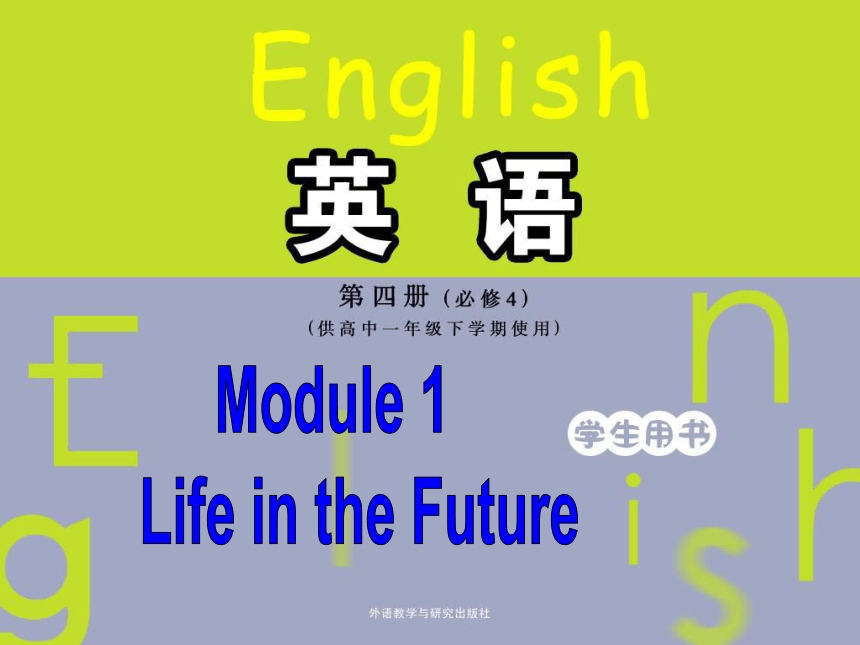 | |
| 格式 | zip | ||
| 文件大小 | 547.9KB | ||
| 资源类型 | 教案 | ||
| 版本资源 | 外研版 | ||
| 科目 | 英语 | ||
| 更新时间 | 2017-01-18 20:15:54 | ||
图片预览

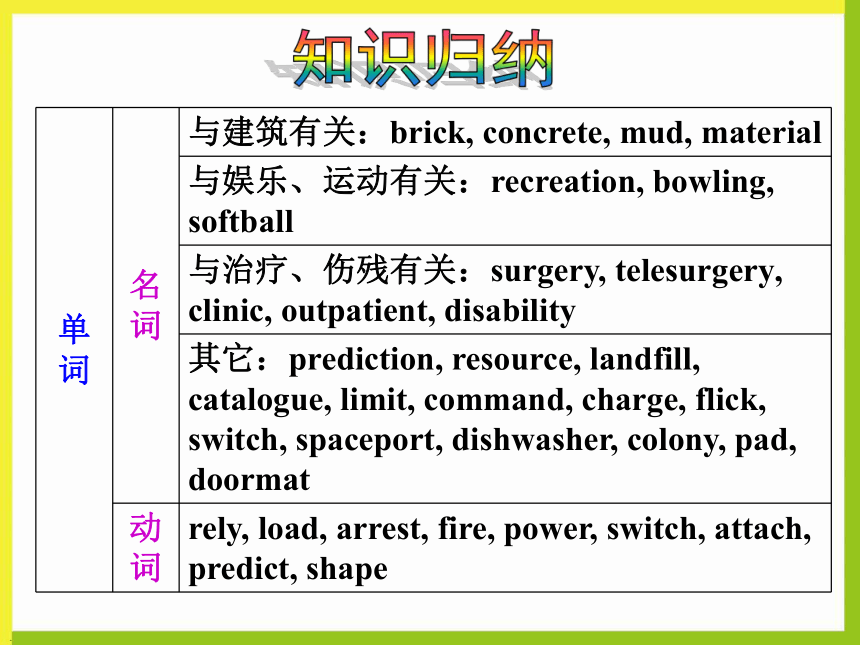
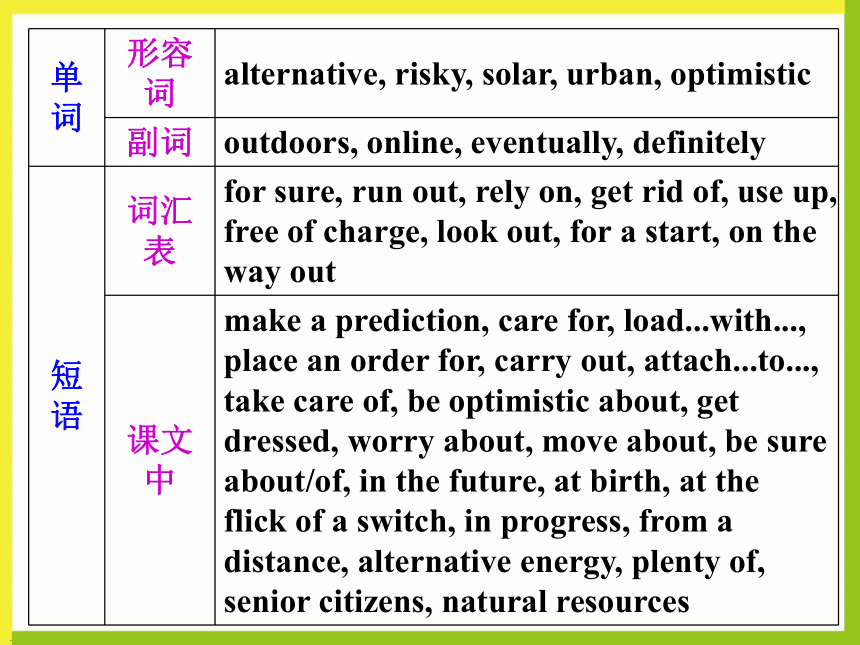
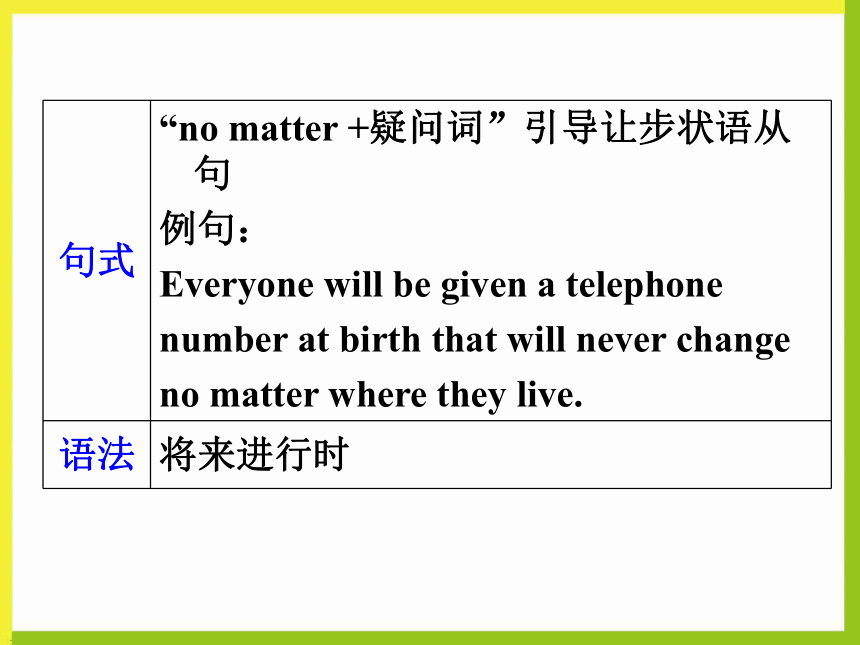
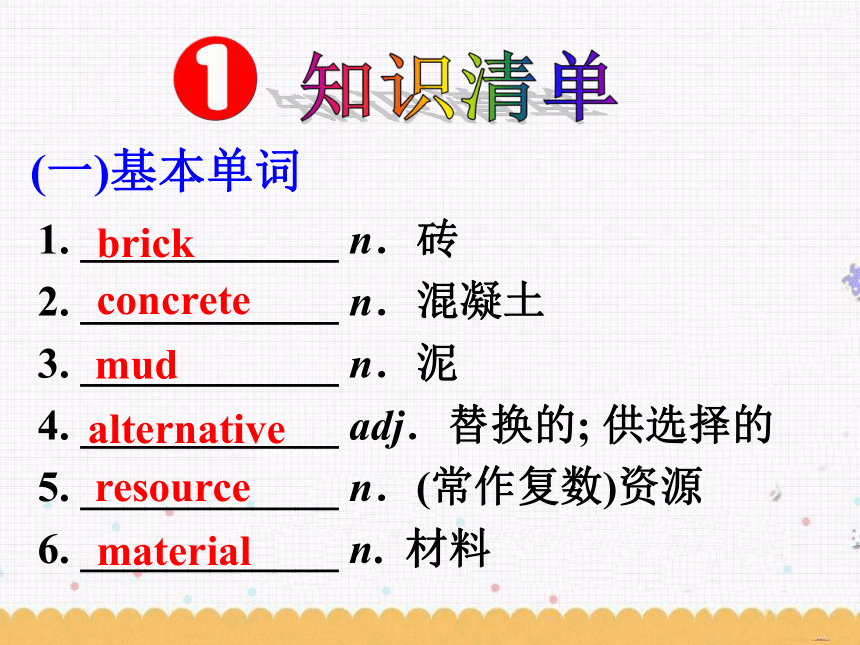
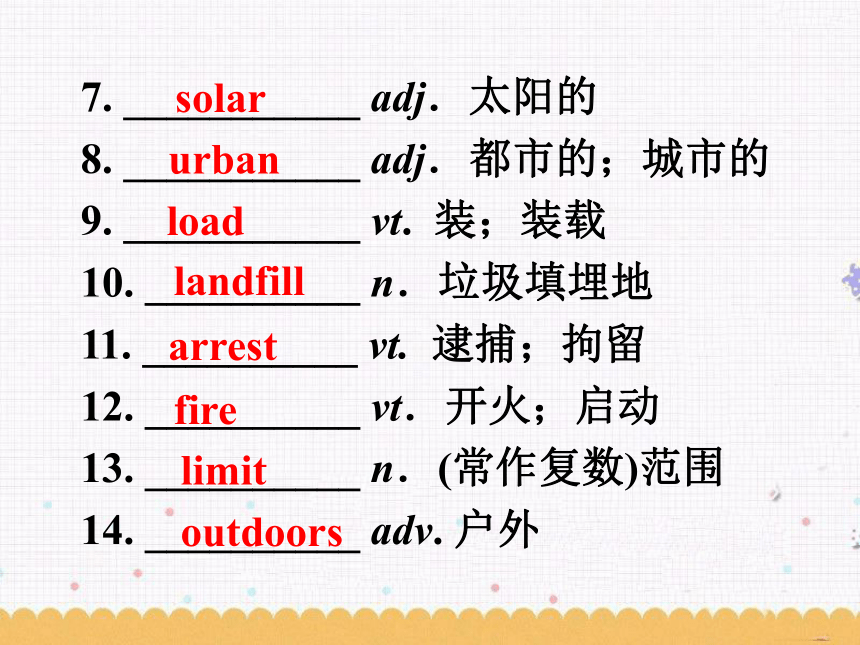
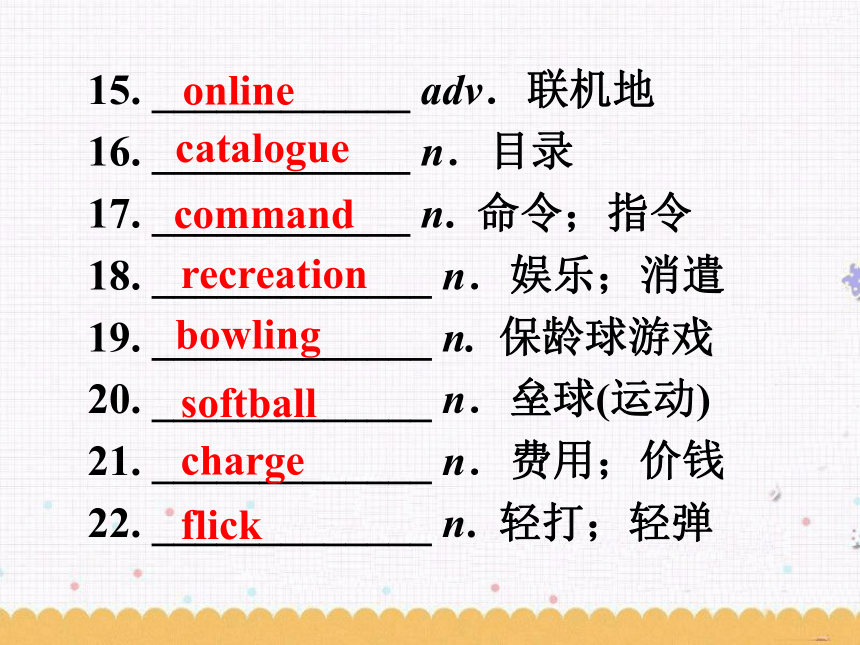
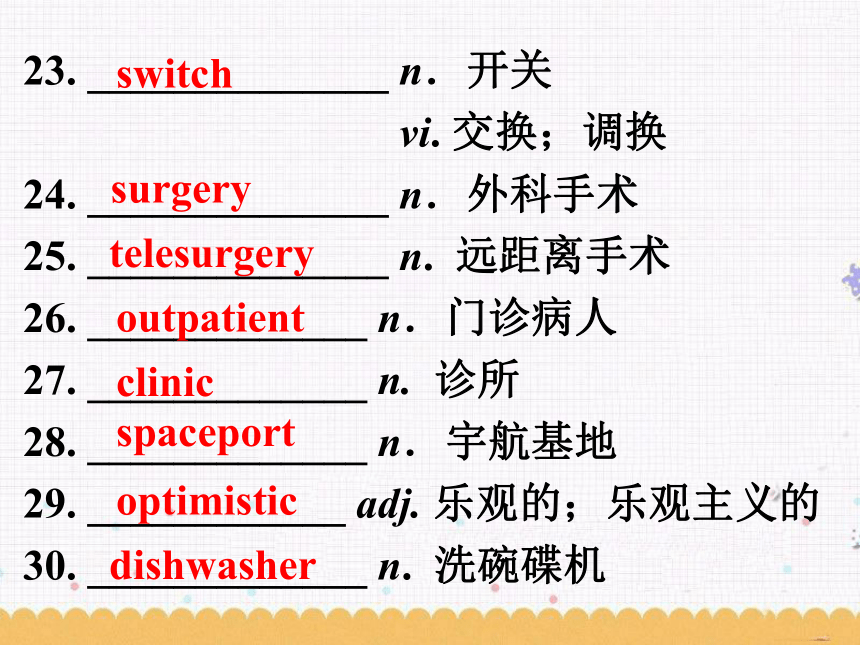
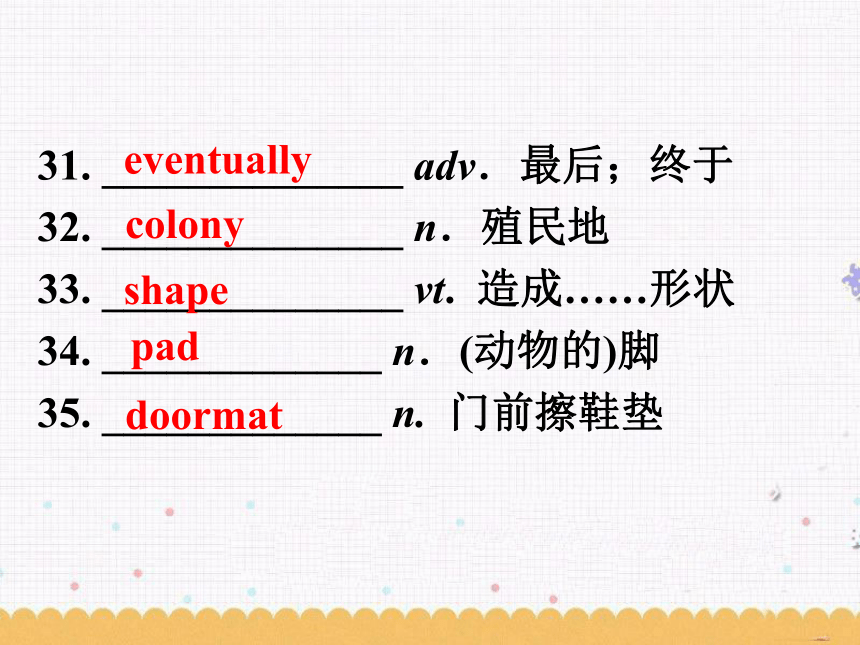
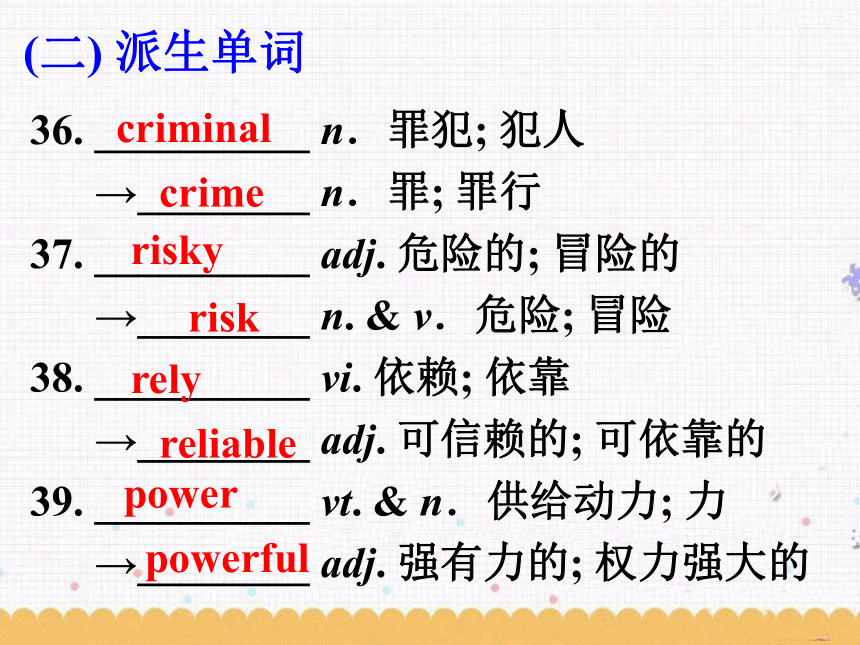
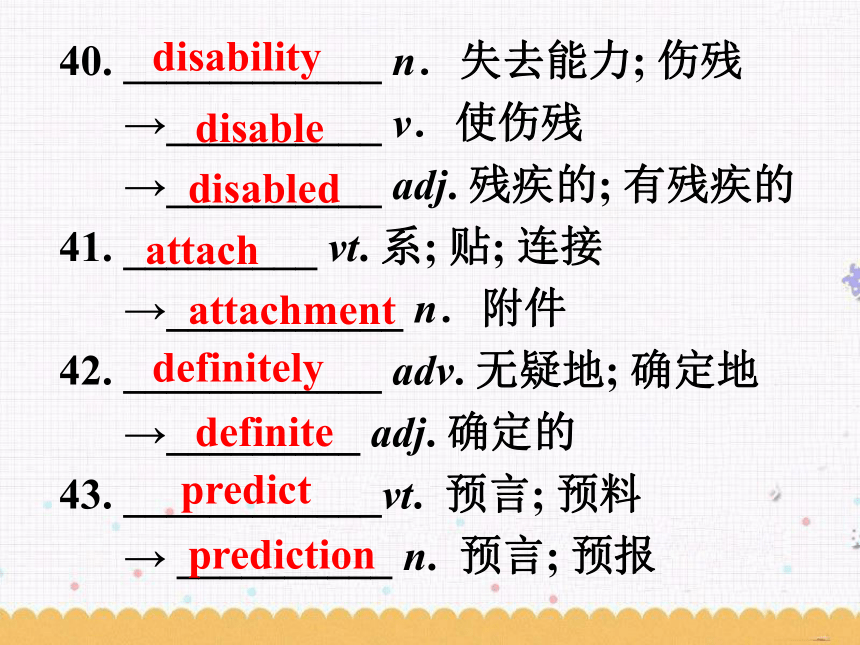
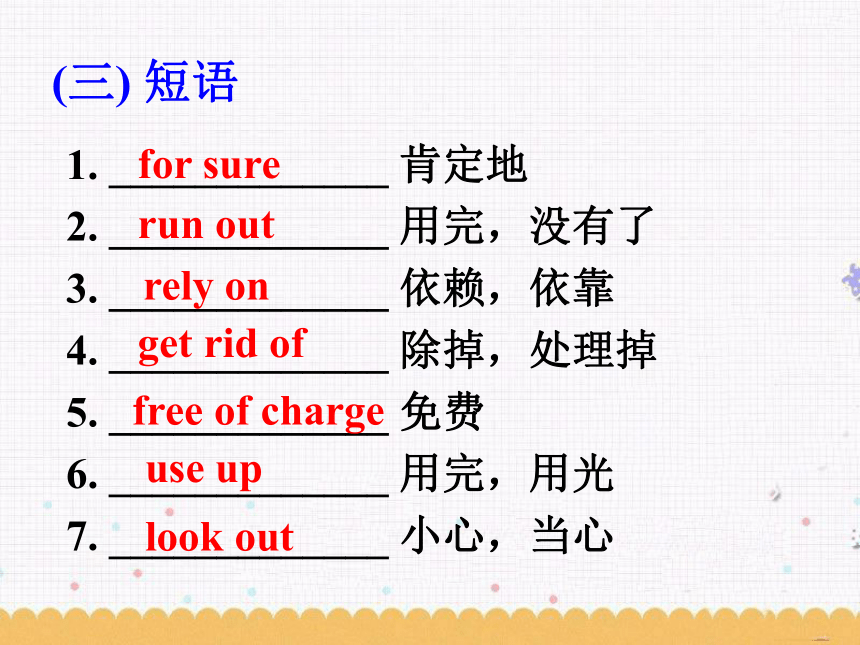
文档简介
课件70张PPT。Module 1
Life in the Future 知识归纳知识清单(一)基本单词1. ____________ n.砖
2. ____________ n.混凝土
3. ____________ n.泥
4. ____________ adj.替换的; 供选择的
5. ____________ n.(常作复数)资源
6. ____________ n. 材料brickconcretemudalternativeresourcematerial7. ___________ adj.太阳的
8. ___________ adj.都市的;城市的
9. ___________ vt. 装;装载
10. __________ n.垃圾填埋地
11. __________ vt. 逮捕;拘留
12. __________ vt.开火;启动
13. __________ n.(常作复数)范围
14. __________ adv. 户外solarurbanloadlandfillarrestfirelimitoutdoors15. ____________ adv.联机地
16. ____________ n.目录
17. ____________ n. 命令;指令
18. _____________ n.娱乐;消遣
19. _____________ n. 保龄球游戏
20. _____________ n.垒球(运动)
21. _____________ n.费用;价钱
22. _____________ n. 轻打;轻弹onlinecataloguecommandrecreationbowlingsoftballchargeflick23. ______________ n.开关
vi. 交换;调换
24. ______________ n.外科手术
25. ______________ n. 远距离手术
26. _____________ n.门诊病人
27. _____________ n. 诊所
28. _____________ n.宇航基地
29. ____________ adj. 乐观的;乐观主义的
30. _____________ n. 洗碗碟机switchsurgerytelesurgeryoutpatientclinicspaceportoptimisticdishwasher31. ______________ adv.最后;终于
32. ______________ n.殖民地
33. ______________ vt. 造成……形状
34. _____________ n.(动物的)脚
35. _____________ n. 门前擦鞋垫eventuallycolonyshapepaddoormat36. __________ n.罪犯; 犯人
→________ n.罪; 罪行
37. __________ adj. 危险的; 冒险的
→________ n. & v.危险; 冒险
38. __________ vi. 依赖; 依靠
→________ adj. 可信赖的; 可依靠的
39. __________ vt. & n.供给动力; 力
→________ adj. 强有力的; 权力强大的 (二) 派生单词criminalcrimeriskyriskrelyreliablepowerpowerful40. ____________ n.失去能力; 伤残
→__________ v.使伤残
→__________ adj. 残疾的; 有残疾的
41. _________ vt. 系; 贴; 连接
→___________ n.附件
42. ____________ adv. 无疑地; 确定地
→_________ adj. 确定的
43. ____________vt. 预言; 预料
→ __________ n. 预言; 预报disabilitydisabledisabledattachattachmentdefinitelydefinitepredictprediction1. _____________ 肯定地
2. _____________ 用完,没有了
3. _____________ 依赖,依靠
4. _____________ 除掉,处理掉
5. _____________ 免费
6. _____________ 用完,用光
7. _____________ 小心,当心(三) 短语for surerun outrely onget rid offree of chargeuse uplook out8. __________________ 首先
9. __________________ 实施
10. _________________ 即将过时
11. _________________ 做预测
12. _________________ 照顾;喜欢
13. _________________ 装载
14. _________________使......与......相关;
把......附加到
15. _________________对......感到乐观 for a startcarry outon the way outmake a predictioncare forload...with...attach...tobe optimistic about1. alternative n.(二者当中)选一个, 供
选择的东西
adj. (二者当中)选其一的,
供选择的核心要点(一) 单词【归纳】
have no alternative but to do...
除……外别无选择
alternative ways 可供选择的两种方法
alternative energy 替代性能源
【拓展】
alternatively adv. 两者挑一地
alternate v. 交替;轮流
alternate...and/with
使交替发生或出现;轮流安排2. limit n.(事物的)界限;限度;极限
vt. 限定;限制
【归纳】
set a limit to = put a limit on
限制; 对……加以限制
to the limit 达到极点
within limits 适度地, 有限地
limit sth. to 限定; 把……限制在……
limit sb. to (doing) sth. 限制某人做某事【拓展】
limited adj. 有限的, 受限制的
be limited to 局限于3. command v. 命令
【归纳】
command sb. to do sth.
命令某人做某事
command that sb. (should) do sth.
命令某人做某事(用虚拟语气 ) command n. 命令, 控制, 管辖, 指挥
【归纳】
at sb.’s command 听候某人的吩咐
in command of sth./take command of/
have command of 控制;
have a good/excellent/poor command
of sth.
很好/完美/没掌握……4. charge vt. 控告;指控;要价,收费;
使充满
【归纳】
charge sb. for (doing) sth.
收取某人(做)……的费用
charge sb. with sth.
指控某人犯……罪 charge n.看管; 费用; 控告; 掌管
【归纳】
free of charge 免费
take charge of 负责管理/照顾
in charge of 负责, 主管
in the charge of 由……管【助记】charge与accuse都有“控告;谴责”的意思。
1) charge指“因犯较大错误或重大罪行而进
行正式法律控诉”。
2) accuse指“当面指控或指责,不一定诉诸
法庭”。
e.g. They accused him of taking bribes.
他们指控他受贿。charge与accuse5. switch vi. 交换;调换
【归纳】
switch on 打开
switch off 关上
switch over 换台6. attach vt. 附上, 系, 贴;连接,参加;
使附属, 使隶属;把……归于
vi. 附着, 附属;相连, 相伴;
系, 贴
attach通常与介词to搭配使用,意为“把……固定/附(在……上)”。
【归纳】
attach sth. to sth. 也可意为“重视, 认为有(重要性、意义、价值等)”, 后常跟importance, significance, value等词。【归纳】
attach oneself to sb. / sth.
依附某人/参加某事
【拓展】
attached adj. (作表语)依恋的; 附属于
attachment n.附件, 附属物
be attached to 依恋, 附属于【助记】7. shape vt. 做成某物的形状; 定形; (使)
成形; 对……有重大影响;
进展; 使(衣服)合身
n.形状; 外形; 样子; 身段
【归纳】
in shape 在形状上; 身体状况良好
be in bad shape
情况处于混乱状态; 健康情况不佳in the shape/form of
以……的形式; 某种形状的
out of shape
状况不佳; 变形; 走样
shape...into...
做成(某事); 塑造成(某形状)
shape...from...
用……材料使……成型1. rely on 依赖, 依靠; 信任, 信赖
【拓展】
rely on/upon=depend on 依赖,信任
rely on/upon sb./ sth. to do...
相信(依赖)某人(某物)去做……
rely on sth./sb. (for...)
(为生活或生存)依赖某物/某人(二) 短语rely on one’s own effort
依靠某人自己的努力
rely on it that...
指望……2. run out (指供应品)用完, 耗尽; 不多
了, 没有
【注意】
run out,give out是不及物动词短语,后面不能跟宾语; run out of, use up是及物动词短语, 其后可以跟宾语。【归纳】
run out of 用完;耗尽
use up 用完;耗尽(有被动语态)give out 通常由物作主语(如:食物储
备、耐心、钱、燃料等), 其后
不跟宾语,无被动语态
【拓展】
run across 偶然遇见某人或发现某物
run after 追赶,追逐
run away from 突然离开……;从……逃
走,极力回避,逃避
run into 偶然遇见某人;(旅行中)遇到(坏
天气);遭遇(困难、问题等)3. get rid of 摆脱某人,除掉某物
【拓展】
get across 传播;讲清楚
get about 走动;(消息等)传开
get in 进入;插话
get into 卷入,陷入
get over 从(疾病、失望等中)恢复过
来; 克服(困难), 解决(问题等)
get together 相聚, 聚集 4. look out 小心, 当心(常用于祈使句,
表示警示或提醒等)
【拓展】
look out for sb./sth.
警惕或留心某人/某物
look ahead 向前看
look back on/to sth. 回忆, 回顾
look down on/upon 轻视, 看不起
look in on sb./at sth. 顺便拜访look into 调查
look on 旁观,观看某事物
look through 浏览,核查
look on/upon...as... 把……当成……
look up 仰视,查阅
look up to sb. 赞赏或尊敬某人I. 根据本模块所学单词及提示写出所缺单词的正确形式。
1. The Internet has become a valuable ________ (资源) in schools.
2. Children living in u_____ centers have a much higher possibility of food allergies than those living in rural areas.urban ???? resource? ?3. He hated being in the army because he had to obey __________ (命令).
4. Parents a______ importance to education. They will do their best to give their children that priceless gift.
5. She is _________ (乐观的) about her chances of winning a gold medal.optimisticcommands? ?attach?II. 用括号内单词的正确形式填空。
1. Please don’t ask me to make any ___________ (predict) about tomorrow’s meeting.
2. It’s ______ (risk) to buy a car without some good advice.riskypredictions3. Helen is deaf, but refuses to let her __________ (disable) prevent her from doing what she wants to do.
4. Please say ________ (definite) whether you will be coming or not.
5. The man is a violent and dangerous ________ (crime).criminaldisabilitydefinitelyIII. 选用方框内合适的短语并用其正确形式填空(每个短语限用一次)。look out for, free of charge, use up, get rid of, rely on, on the way out1. You don’t have to pay for it. In other words, the delivery is _____________.
2. It’s easy to get into the habit of taking drugs but hard to ________ it.get rid of? free of charge?3. We have ________ all the soap. Remember to buy some.
4. That type of dress Julie wears is ______
________. So I hope she chooses different ones in future.
5. There were signs everywhere warning people to ___________ falling rocks.
6. Many working women ________ relatives to help take care of their children.rely onused up? ?on thelook out for?way out1. Distance surgery will become common
as doctors carry out operations from thousands of miles away, with each city having its own telesurgery outpatient clinic.
医生在几千英里以外为病人动手术的远程治疗成为常事,因为每个城市都有自己的远程诊所。(三) 句式with each city having its own telesurgery outpatient clinic
是一个独立结构,其形式为with+名词/代词+现在分词短语。2. I’m too busy enjoying my life now to
worry about the future!
我现在忙于享受生活没时间为未来担忧!
1) 一般来说, too...to do结构表示否定的 意思, 意为“太……而不能……”。2) 当too后面是kind, ready, willing, eager, anxious, satisfied, happy, glad等表示态度、心情的形容词时, 该结构不表示结果, 也无否定意义, too在此时的意义相当于very。
e.g. It’s too good an opportunity to miss.
这真是一个很好的机会, 不能错过。
He is too willing to follow others’ advice.
他极愿意接受别人的意见。3)当too前面有否定词never, only或后面有not时, 其语法结构发生变化, 意思表示强烈的肯定。
4)如果将not放在不定式前面, 动词不定式则由先前的否定概念转为否定之否定概念, 即肯定的意思“太……不能不……”。
e.g. It’s not too late to do your homework
now.
现在做作业还不太晚。3. Not all predictions come true.
不是所有的预言都能变为现实。
not all=all not为部分否定,表示“并非所有的……都……”。
e.g. Not everybody likes the same dish.
=Everybody doesn’t like the same
dish.
不是每个人都有同样的品味。部分否定与全部否定的惯用语对照如下:翻译句子。
1) 并非所有的鸟儿都会飞。
Not all birds can fly./All birds can’t fly.
2) 并非每一本书都让我感兴趣。
Not every book interests me./Every
book does not interest me.语法将来进行时
【归纳】
将来进行时表示将来某一时间正在进行 的动作、预料要发生的或即将发生的动作。一、构成二、用法
1. 表示将来某一时刻或某段时间内发生的动作, 常与表将来的时间状语连用。如:
This time tomorrow, we’ll be sitting in the cinema and watching a film.
On Saturday morning, Bill will be working in the garden and Ann will be shopping.2. 表示已经决定或安排好的要发生的动作或事情。如:
—Would it be any trouble for you to post this
letter?
—No, not at all. I shall be going out this afternoon.
3. 表示预料中要发生的动作。如:
The roses will be coming out soon.
It’s already six o'clock. He won't be working now.
4. 解释将来动作发生的原因。如:
I won’t be able to watch the program because I’ll be doing my homework.5. 表示未来的结果。如:
If you don’t make a call, they will be wondering what has happened to you.
6. 表示委婉的语气。如:
Will you be having some tea?
If you will be wanting anything, just let me know.用括号内动词的正确形式填空。
1. A: I ______________ (arrive) at the station tomorrow morning.
B: OK. I __________________ (wait) for you when your train arrives.will/shall be waitingwill/shall arrive2. A: The holiday ________ (come). What are you planning to do?
B: I’m going to travel to Hong Kong. Actually, I will be on the plane tonight, and this time tomorrow I ____________________ (shop) in the mall. What about you?
A: You know I have always wanted to go to Sanya, so probably I ________________ (lie) on a beach when you are shopping.will/shall be lyingwill/shall be shoppingis coming3. A: We are having a party tonight. Would you like to join us?
B: I’d like to, but I’m afraid I ______________________ (babysit) my little brother this evening.will/shall be babysitting写作【写作任务】
一家英语报社向中学生征文,主题是“十年后的我”。请根据下列要点和你的畅想完成短文。
1. 家庭;
2. 工作;
3. 业余生活。
注意:1. 词数100左右;2. 可以适当增加细节,以使行文连贯;3. 开头语已为你写好。
I often imagine what my life will be like in the future. 如何写想象类作文【写作指导】
1. 审题定调:
本写作任务要求设想未来生活, 文体为记叙文。写作时要注意以下几点:
①想象要合情合理, 要结合自身情况与社会发展趋势;
②写作目的要明确, 段落叙述始终围绕主题展开,避免与主题无关的内容;
③在写作过程中, 合理使用连接词, 使文章衔接更加自然。2. 确定主体内容:
全文可分为三部分:
第一部分:引出话题;
第二部分:描述十年后的生活,包括家庭、工作和业余生活三个方面;
第三部分:进行简要总结。
3. 确定人称、时态:
描述自己未来的生活,人称用第一人称;时态以一般将来时为主。4. 常用表达:
what my life will be like in the future
in ... years
by then
in one’s free time
in a word / in conclusion
I’ll be working in ... as ...
..., my life will be ...
It would be wonderful if ...
Just imagine if ...
We can only guess ...【参考范文】
I often imagine what my life will be like in the future. I think my life will be very different in ten years.
I will be twenty-eight years old by then. I will have my own family, probably with a lovely child. I hope I'll work in a computer company as a program designer. I'll enjoy my work and get along well with my workmates. I'll do a good job in whatever I do. In my free time, I'll continue to take regular exercise, such as swimming, running and all kinds of ball games. On holidays, I'll travel around the world.
In a word, my life will be much richer and more colourful.巩固练习I. 用适当的介词或副词填空。
1. The men loaded the truck _____ books.
2. I had some difficulties in carrying _____ the plan.
3. She attached a chain ____ the dog’s collar.
4. The movement has been _____ progress for several years.in withouttoII. 翻译下列句子。
1. 明天这个时候你将做什么?
What will you be doing this time tomorrow?
2. 明天上午我要给一位朋友送行。
I will be seeing a friend off tomorrow morning.III. 阅读下面材料,在空白处填入适当的
内容(不多于3个单词)或括号内单词的正确
形式。
1984 is a novel about a future world,
written by George Orwell and published in
1949. His prediction of the future is not 1.
___ very optimistic one. 2. ____ takes place
in Airstrip One, which used to be Great
Britain, but is now a province of the
superstate Oceania. There are two other
superstates, Eurasia and Eastasia. TheseIta?three superstates are constantly fighting wars for the remaining 3. ______________ (conquer) lands of the world and make and break alliances with each other whenever it is convenient.
In Airstrip One, the majority, 4. ______ are poor working class people, 5. _________ (call) Proles. A small number of Inner Party members have all the power and members of the Outer Party administer it. The ministriesare called ?unconquered?who?the Outer Party members serve and the work they do there are full of 6. ______________ (contradict). The Ministry of Love tortures (折磨) people, the Ministry of Plenty deals with limited resources and hunger, the Ministry of Peace deals with war, and the Ministry of Truth deals with lies and changing history.
?????? The main character of the novel, Winston Smith, works 7. ____ the Ministry of TruthforcontradictionsHe rewrites newspaper articles so the Party always looks right, never makes any mistakes and never changes its mind. Winston Smith 8. ________ (secret) hates this future world but, as there are cameras and informers (告密者) everywhere, his secret is eventually found 9. _____ and he is arrested. In 1984, the British Prime Minister, Margaret Thatcher, famously declared that, “Orwell was wrong.” One wonders 10. ____ she felt the need to say so.out?secretlywhy
Life in the Future 知识归纳知识清单(一)基本单词1. ____________ n.砖
2. ____________ n.混凝土
3. ____________ n.泥
4. ____________ adj.替换的; 供选择的
5. ____________ n.(常作复数)资源
6. ____________ n. 材料brickconcretemudalternativeresourcematerial7. ___________ adj.太阳的
8. ___________ adj.都市的;城市的
9. ___________ vt. 装;装载
10. __________ n.垃圾填埋地
11. __________ vt. 逮捕;拘留
12. __________ vt.开火;启动
13. __________ n.(常作复数)范围
14. __________ adv. 户外solarurbanloadlandfillarrestfirelimitoutdoors15. ____________ adv.联机地
16. ____________ n.目录
17. ____________ n. 命令;指令
18. _____________ n.娱乐;消遣
19. _____________ n. 保龄球游戏
20. _____________ n.垒球(运动)
21. _____________ n.费用;价钱
22. _____________ n. 轻打;轻弹onlinecataloguecommandrecreationbowlingsoftballchargeflick23. ______________ n.开关
vi. 交换;调换
24. ______________ n.外科手术
25. ______________ n. 远距离手术
26. _____________ n.门诊病人
27. _____________ n. 诊所
28. _____________ n.宇航基地
29. ____________ adj. 乐观的;乐观主义的
30. _____________ n. 洗碗碟机switchsurgerytelesurgeryoutpatientclinicspaceportoptimisticdishwasher31. ______________ adv.最后;终于
32. ______________ n.殖民地
33. ______________ vt. 造成……形状
34. _____________ n.(动物的)脚
35. _____________ n. 门前擦鞋垫eventuallycolonyshapepaddoormat36. __________ n.罪犯; 犯人
→________ n.罪; 罪行
37. __________ adj. 危险的; 冒险的
→________ n. & v.危险; 冒险
38. __________ vi. 依赖; 依靠
→________ adj. 可信赖的; 可依靠的
39. __________ vt. & n.供给动力; 力
→________ adj. 强有力的; 权力强大的 (二) 派生单词criminalcrimeriskyriskrelyreliablepowerpowerful40. ____________ n.失去能力; 伤残
→__________ v.使伤残
→__________ adj. 残疾的; 有残疾的
41. _________ vt. 系; 贴; 连接
→___________ n.附件
42. ____________ adv. 无疑地; 确定地
→_________ adj. 确定的
43. ____________vt. 预言; 预料
→ __________ n. 预言; 预报disabilitydisabledisabledattachattachmentdefinitelydefinitepredictprediction1. _____________ 肯定地
2. _____________ 用完,没有了
3. _____________ 依赖,依靠
4. _____________ 除掉,处理掉
5. _____________ 免费
6. _____________ 用完,用光
7. _____________ 小心,当心(三) 短语for surerun outrely onget rid offree of chargeuse uplook out8. __________________ 首先
9. __________________ 实施
10. _________________ 即将过时
11. _________________ 做预测
12. _________________ 照顾;喜欢
13. _________________ 装载
14. _________________使......与......相关;
把......附加到
15. _________________对......感到乐观 for a startcarry outon the way outmake a predictioncare forload...with...attach...tobe optimistic about1. alternative n.(二者当中)选一个, 供
选择的东西
adj. (二者当中)选其一的,
供选择的核心要点(一) 单词【归纳】
have no alternative but to do...
除……外别无选择
alternative ways 可供选择的两种方法
alternative energy 替代性能源
【拓展】
alternatively adv. 两者挑一地
alternate v. 交替;轮流
alternate...and/with
使交替发生或出现;轮流安排2. limit n.(事物的)界限;限度;极限
vt. 限定;限制
【归纳】
set a limit to = put a limit on
限制; 对……加以限制
to the limit 达到极点
within limits 适度地, 有限地
limit sth. to 限定; 把……限制在……
limit sb. to (doing) sth. 限制某人做某事【拓展】
limited adj. 有限的, 受限制的
be limited to 局限于3. command v. 命令
【归纳】
command sb. to do sth.
命令某人做某事
command that sb. (should) do sth.
命令某人做某事(用虚拟语气 ) command n. 命令, 控制, 管辖, 指挥
【归纳】
at sb.’s command 听候某人的吩咐
in command of sth./take command of/
have command of 控制;
have a good/excellent/poor command
of sth.
很好/完美/没掌握……4. charge vt. 控告;指控;要价,收费;
使充满
【归纳】
charge sb. for (doing) sth.
收取某人(做)……的费用
charge sb. with sth.
指控某人犯……罪 charge n.看管; 费用; 控告; 掌管
【归纳】
free of charge 免费
take charge of 负责管理/照顾
in charge of 负责, 主管
in the charge of 由……管【助记】charge与accuse都有“控告;谴责”的意思。
1) charge指“因犯较大错误或重大罪行而进
行正式法律控诉”。
2) accuse指“当面指控或指责,不一定诉诸
法庭”。
e.g. They accused him of taking bribes.
他们指控他受贿。charge与accuse5. switch vi. 交换;调换
【归纳】
switch on 打开
switch off 关上
switch over 换台6. attach vt. 附上, 系, 贴;连接,参加;
使附属, 使隶属;把……归于
vi. 附着, 附属;相连, 相伴;
系, 贴
attach通常与介词to搭配使用,意为“把……固定/附(在……上)”。
【归纳】
attach sth. to sth. 也可意为“重视, 认为有(重要性、意义、价值等)”, 后常跟importance, significance, value等词。【归纳】
attach oneself to sb. / sth.
依附某人/参加某事
【拓展】
attached adj. (作表语)依恋的; 附属于
attachment n.附件, 附属物
be attached to 依恋, 附属于【助记】7. shape vt. 做成某物的形状; 定形; (使)
成形; 对……有重大影响;
进展; 使(衣服)合身
n.形状; 外形; 样子; 身段
【归纳】
in shape 在形状上; 身体状况良好
be in bad shape
情况处于混乱状态; 健康情况不佳in the shape/form of
以……的形式; 某种形状的
out of shape
状况不佳; 变形; 走样
shape...into...
做成(某事); 塑造成(某形状)
shape...from...
用……材料使……成型1. rely on 依赖, 依靠; 信任, 信赖
【拓展】
rely on/upon=depend on 依赖,信任
rely on/upon sb./ sth. to do...
相信(依赖)某人(某物)去做……
rely on sth./sb. (for...)
(为生活或生存)依赖某物/某人(二) 短语rely on one’s own effort
依靠某人自己的努力
rely on it that...
指望……2. run out (指供应品)用完, 耗尽; 不多
了, 没有
【注意】
run out,give out是不及物动词短语,后面不能跟宾语; run out of, use up是及物动词短语, 其后可以跟宾语。【归纳】
run out of 用完;耗尽
use up 用完;耗尽(有被动语态)give out 通常由物作主语(如:食物储
备、耐心、钱、燃料等), 其后
不跟宾语,无被动语态
【拓展】
run across 偶然遇见某人或发现某物
run after 追赶,追逐
run away from 突然离开……;从……逃
走,极力回避,逃避
run into 偶然遇见某人;(旅行中)遇到(坏
天气);遭遇(困难、问题等)3. get rid of 摆脱某人,除掉某物
【拓展】
get across 传播;讲清楚
get about 走动;(消息等)传开
get in 进入;插话
get into 卷入,陷入
get over 从(疾病、失望等中)恢复过
来; 克服(困难), 解决(问题等)
get together 相聚, 聚集 4. look out 小心, 当心(常用于祈使句,
表示警示或提醒等)
【拓展】
look out for sb./sth.
警惕或留心某人/某物
look ahead 向前看
look back on/to sth. 回忆, 回顾
look down on/upon 轻视, 看不起
look in on sb./at sth. 顺便拜访look into 调查
look on 旁观,观看某事物
look through 浏览,核查
look on/upon...as... 把……当成……
look up 仰视,查阅
look up to sb. 赞赏或尊敬某人I. 根据本模块所学单词及提示写出所缺单词的正确形式。
1. The Internet has become a valuable ________ (资源) in schools.
2. Children living in u_____ centers have a much higher possibility of food allergies than those living in rural areas.urban ???? resource? ?3. He hated being in the army because he had to obey __________ (命令).
4. Parents a______ importance to education. They will do their best to give their children that priceless gift.
5. She is _________ (乐观的) about her chances of winning a gold medal.optimisticcommands? ?attach?II. 用括号内单词的正确形式填空。
1. Please don’t ask me to make any ___________ (predict) about tomorrow’s meeting.
2. It’s ______ (risk) to buy a car without some good advice.riskypredictions3. Helen is deaf, but refuses to let her __________ (disable) prevent her from doing what she wants to do.
4. Please say ________ (definite) whether you will be coming or not.
5. The man is a violent and dangerous ________ (crime).criminaldisabilitydefinitelyIII. 选用方框内合适的短语并用其正确形式填空(每个短语限用一次)。look out for, free of charge, use up, get rid of, rely on, on the way out1. You don’t have to pay for it. In other words, the delivery is _____________.
2. It’s easy to get into the habit of taking drugs but hard to ________ it.get rid of? free of charge?3. We have ________ all the soap. Remember to buy some.
4. That type of dress Julie wears is ______
________. So I hope she chooses different ones in future.
5. There were signs everywhere warning people to ___________ falling rocks.
6. Many working women ________ relatives to help take care of their children.rely onused up? ?on thelook out for?way out1. Distance surgery will become common
as doctors carry out operations from thousands of miles away, with each city having its own telesurgery outpatient clinic.
医生在几千英里以外为病人动手术的远程治疗成为常事,因为每个城市都有自己的远程诊所。(三) 句式with each city having its own telesurgery outpatient clinic
是一个独立结构,其形式为with+名词/代词+现在分词短语。2. I’m too busy enjoying my life now to
worry about the future!
我现在忙于享受生活没时间为未来担忧!
1) 一般来说, too...to do结构表示否定的 意思, 意为“太……而不能……”。2) 当too后面是kind, ready, willing, eager, anxious, satisfied, happy, glad等表示态度、心情的形容词时, 该结构不表示结果, 也无否定意义, too在此时的意义相当于very。
e.g. It’s too good an opportunity to miss.
这真是一个很好的机会, 不能错过。
He is too willing to follow others’ advice.
他极愿意接受别人的意见。3)当too前面有否定词never, only或后面有not时, 其语法结构发生变化, 意思表示强烈的肯定。
4)如果将not放在不定式前面, 动词不定式则由先前的否定概念转为否定之否定概念, 即肯定的意思“太……不能不……”。
e.g. It’s not too late to do your homework
now.
现在做作业还不太晚。3. Not all predictions come true.
不是所有的预言都能变为现实。
not all=all not为部分否定,表示“并非所有的……都……”。
e.g. Not everybody likes the same dish.
=Everybody doesn’t like the same
dish.
不是每个人都有同样的品味。部分否定与全部否定的惯用语对照如下:翻译句子。
1) 并非所有的鸟儿都会飞。
Not all birds can fly./All birds can’t fly.
2) 并非每一本书都让我感兴趣。
Not every book interests me./Every
book does not interest me.语法将来进行时
【归纳】
将来进行时表示将来某一时间正在进行 的动作、预料要发生的或即将发生的动作。一、构成二、用法
1. 表示将来某一时刻或某段时间内发生的动作, 常与表将来的时间状语连用。如:
This time tomorrow, we’ll be sitting in the cinema and watching a film.
On Saturday morning, Bill will be working in the garden and Ann will be shopping.2. 表示已经决定或安排好的要发生的动作或事情。如:
—Would it be any trouble for you to post this
letter?
—No, not at all. I shall be going out this afternoon.
3. 表示预料中要发生的动作。如:
The roses will be coming out soon.
It’s already six o'clock. He won't be working now.
4. 解释将来动作发生的原因。如:
I won’t be able to watch the program because I’ll be doing my homework.5. 表示未来的结果。如:
If you don’t make a call, they will be wondering what has happened to you.
6. 表示委婉的语气。如:
Will you be having some tea?
If you will be wanting anything, just let me know.用括号内动词的正确形式填空。
1. A: I ______________ (arrive) at the station tomorrow morning.
B: OK. I __________________ (wait) for you when your train arrives.will/shall be waitingwill/shall arrive2. A: The holiday ________ (come). What are you planning to do?
B: I’m going to travel to Hong Kong. Actually, I will be on the plane tonight, and this time tomorrow I ____________________ (shop) in the mall. What about you?
A: You know I have always wanted to go to Sanya, so probably I ________________ (lie) on a beach when you are shopping.will/shall be lyingwill/shall be shoppingis coming3. A: We are having a party tonight. Would you like to join us?
B: I’d like to, but I’m afraid I ______________________ (babysit) my little brother this evening.will/shall be babysitting写作【写作任务】
一家英语报社向中学生征文,主题是“十年后的我”。请根据下列要点和你的畅想完成短文。
1. 家庭;
2. 工作;
3. 业余生活。
注意:1. 词数100左右;2. 可以适当增加细节,以使行文连贯;3. 开头语已为你写好。
I often imagine what my life will be like in the future. 如何写想象类作文【写作指导】
1. 审题定调:
本写作任务要求设想未来生活, 文体为记叙文。写作时要注意以下几点:
①想象要合情合理, 要结合自身情况与社会发展趋势;
②写作目的要明确, 段落叙述始终围绕主题展开,避免与主题无关的内容;
③在写作过程中, 合理使用连接词, 使文章衔接更加自然。2. 确定主体内容:
全文可分为三部分:
第一部分:引出话题;
第二部分:描述十年后的生活,包括家庭、工作和业余生活三个方面;
第三部分:进行简要总结。
3. 确定人称、时态:
描述自己未来的生活,人称用第一人称;时态以一般将来时为主。4. 常用表达:
what my life will be like in the future
in ... years
by then
in one’s free time
in a word / in conclusion
I’ll be working in ... as ...
..., my life will be ...
It would be wonderful if ...
Just imagine if ...
We can only guess ...【参考范文】
I often imagine what my life will be like in the future. I think my life will be very different in ten years.
I will be twenty-eight years old by then. I will have my own family, probably with a lovely child. I hope I'll work in a computer company as a program designer. I'll enjoy my work and get along well with my workmates. I'll do a good job in whatever I do. In my free time, I'll continue to take regular exercise, such as swimming, running and all kinds of ball games. On holidays, I'll travel around the world.
In a word, my life will be much richer and more colourful.巩固练习I. 用适当的介词或副词填空。
1. The men loaded the truck _____ books.
2. I had some difficulties in carrying _____ the plan.
3. She attached a chain ____ the dog’s collar.
4. The movement has been _____ progress for several years.in withouttoII. 翻译下列句子。
1. 明天这个时候你将做什么?
What will you be doing this time tomorrow?
2. 明天上午我要给一位朋友送行。
I will be seeing a friend off tomorrow morning.III. 阅读下面材料,在空白处填入适当的
内容(不多于3个单词)或括号内单词的正确
形式。
1984 is a novel about a future world,
written by George Orwell and published in
1949. His prediction of the future is not 1.
___ very optimistic one. 2. ____ takes place
in Airstrip One, which used to be Great
Britain, but is now a province of the
superstate Oceania. There are two other
superstates, Eurasia and Eastasia. TheseIta?three superstates are constantly fighting wars for the remaining 3. ______________ (conquer) lands of the world and make and break alliances with each other whenever it is convenient.
In Airstrip One, the majority, 4. ______ are poor working class people, 5. _________ (call) Proles. A small number of Inner Party members have all the power and members of the Outer Party administer it. The ministriesare called ?unconquered?who?the Outer Party members serve and the work they do there are full of 6. ______________ (contradict). The Ministry of Love tortures (折磨) people, the Ministry of Plenty deals with limited resources and hunger, the Ministry of Peace deals with war, and the Ministry of Truth deals with lies and changing history.
?????? The main character of the novel, Winston Smith, works 7. ____ the Ministry of TruthforcontradictionsHe rewrites newspaper articles so the Party always looks right, never makes any mistakes and never changes its mind. Winston Smith 8. ________ (secret) hates this future world but, as there are cameras and informers (告密者) everywhere, his secret is eventually found 9. _____ and he is arrested. In 1984, the British Prime Minister, Margaret Thatcher, famously declared that, “Orwell was wrong.” One wonders 10. ____ she felt the need to say so.out?secretlywhy
